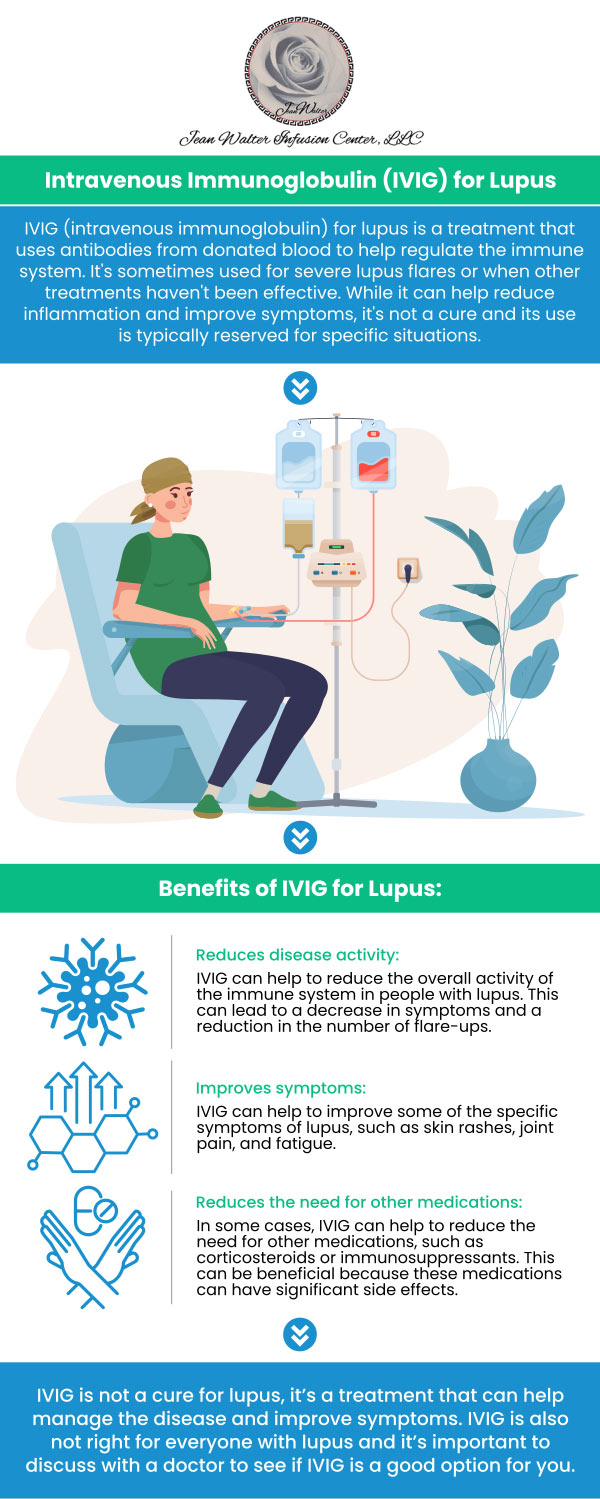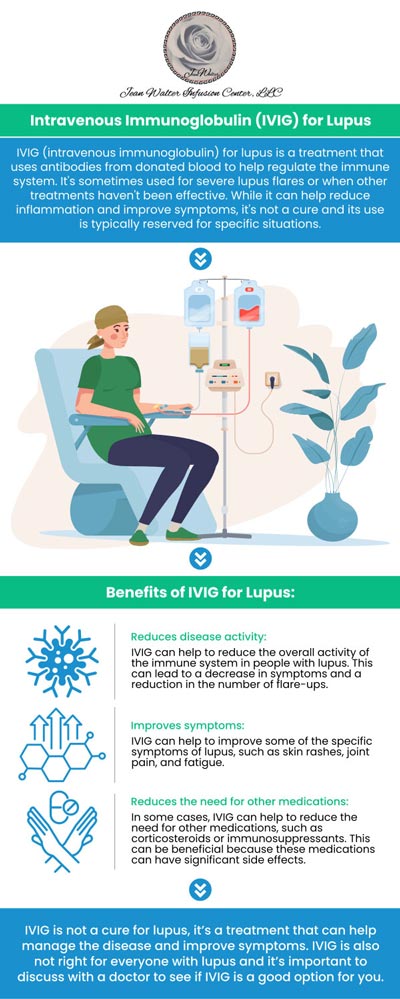Is IVIG a Good Option for Lupus Management in Catonsville MD?
Intravenous immunoglobulin, or IVIG, may be suggested as a treatment to help restore your antibodies if you are dealing with lupus that affects your immune system. IVIG can also help protect against infections, especially when other immunosuppressive treatments have lowered a patient’s natural antibody levels. Visit Dr. Nasseri, MD, and his experienced staff for lupus treatment. For more information, contact us or request an appointment online. We are conveniently located at 700 Geipe Rd, Suite 200A, Catonsville, MD 21228.


Table of Contents:
How effective is IVIG in reducing lupus flare-ups and controlling symptoms?
What are the potential benefits of using IVIG in managing lupus compared to other treatments?
Are there specific types of lupus that respond better to IVIG therapy?
How does IVIG work to modulate the immune system in lupus patients?
At Jean Walter Infusion Center, we offer intravenous immunoglobulin (IVIG) therapy as a specialized treatment option for patients with systemic lupus erythematosus (SLE) who require advanced care. IVIG is an immune-modulating therapy that may be recommended when conventional lupus treatments are not effective or when patients cannot tolerate standard immunosuppressive medications.
Our infusion center is experienced in administering IVIG for individuals with severe or refractory lupus, including those with complications such as lupus nephritis, thrombocytopenia, or neuropsychiatric symptoms. IVIG works by supplying healthy antibodies that help regulate an overactive immune system, potentially reducing inflammation and helping to control autoimmune activity in lupus. Many patients report improvement in symptoms—such as joint pain, skin rashes, and low blood counts—and a decrease in the frequency and severity of flare-ups after receiving IVIG.
Although IVIG is not a first-line treatment for lupus, it can play a crucial role in short-term management or in special situations where other therapies have failed or are not suitable.
We recognize that the benefits of IVIG can vary between patients, and our center is committed to providing compassionate, expert care throughout your treatment journey.
Intravenous immunoglobulin (IVIG) therapy can be invaluable for certain patients with lupus who do not respond well to standard therapies like corticosteroids or immunosuppressive drugs, or for whom these treatments may be contraindicated.
IVIG is a preparation of pooled antibodies from healthy donors, administered intravenously in our comfortable infusion suites under the supervision of our experienced clinical team. While the exact mechanism by which IVIG benefits lupus patients is still being studied, it is known to modulate the immune system, offering an alternative approach for controlling disease activity.
A key advantage of IVIG therapy is its rapid onset of action. For patients experiencing acute or severe lupus flares—such as those affecting the nervous system or blood cells—IVIG can sometimes bring improvement within days, much faster than some traditional immunosuppressive medications. Additionally, because IVIG does not induce long-term immunosuppression, it offers a reduced risk of serious infections, making it a valuable option for patients who are at higher risk with standard therapies.
IVIG can also be considered for lupus patients during pregnancy, as it may present fewer risks to the developing fetus compared to some conventional medications.
We also see benefits of IVIG for patients with lupus who have specific complications, such as immune-mediated thrombocytopenia (low platelet count) or severe neuropsychiatric involvement, especially when other therapies have not been effective.
It’s important to note that while IVIG is a valuable therapeutic tool, it is not a first-line treatment for lupus due to factors such as cost, availability, and potential side effects, including infusion reactions, headaches, or rare kidney and clotting complications. At Jean Walter Infusion Center, we carefully evaluate each patient to determine if IVIG is appropriate and monitor closely throughout the treatment process to ensure your safety and comfort.
At Jean Walter Infusion Center, we recognize that lupus, particularly systemic lupus erythematosus (SLE), can present unique treatment challenges. Intravenous immunoglobulin (IVIG) therapy is one of the advanced options for patients whose lupus has not responded to standard therapies like corticosteroids or immunosuppressive medications, or for those who experience significant side effects from these drugs.
Our Approach to IVIG in Lupus:
IVIG therapy at our center is most frequently considered for patients with severe manifestations of lupus, such as:
• Thrombocytopenia: Marked reduction in platelets
• Hemolytic anemia: Destruction of red blood cells
• Neurological involvement: When lupus affects the nervous system
In these cases, IVIG can be an effective way to control symptoms and manage acute flares, especially when a rapid response is needed or other treatments have failed. We also consider IVIG for patients with lupus who have developed secondary complications like antiphospholipid syndrome or hypogammaglobulinemia due to prior immunosuppressive therapy.
While IVIG is not typically used for cutaneous lupus (which primarily affects the skin) or lupus nephritis (kidney involvement), our team carefully evaluates each patient’s unique condition, symptoms, and treatment history before making a recommendation.
Why Choose Jean Walter Infusion Center?
• Expert Care: Our experienced infusion nurses and collaborating specialists ensure safe and effective administration of IVIG therapy.
• Individualized Treatment: We work closely with your rheumatologist or referring physician to tailor an IVIG treatment plan that suits your specific needs and lupus subtype.
Comprehensive Monitoring: We prioritize patient safety with close monitoring during and after infusions, helping you achieve the best possible outcome.
For patients with lupus, the immune system mistakenly attacks the body’s own tissues, causing inflammation and potential organ damage. IVIG can be a valuable treatment option, especially when standard therapies are not effective or cannot be used.
How IVIG Works in Lupus
The mechanisms by which IVIG helps lupus patients are multifaceted:
• Neutralizing Harmful Autoantibodies: IVIG provides a large supply of healthy antibodies that can block and neutralize the autoantibodies responsible for tissue damage in lupus.
• Regulating Immune Cells: IVIG interacts with key immune cells (B cells and T cells), suppressing their overactivity and reducing the production of inflammatory substances.
• Modulating Fc Receptors: By saturating Fc receptors on immune cells, IVIG helps prevent excessive immune activation and inflammation.
• Affecting the Complement System: IVIG can interfere with components of the immune system that drive inflammation and tissue damage, providing added protection.
While IVIG is not a cure for lupus, it can be a crucial therapy for patients experiencing severe disease flares or those who have not responded to other treatments. Our center offers a comfortable, patient-focused environment for your infusion therapy, with continuous monitoring and support from our skilled nursing staff.
If you or a loved one is considering IVIG as part of lupus management, or if your provider has recommended this therapy, Jean Walter Infusion Center is here to help. For more information, contact us or request an appointment online. We are conveniently located at 700 Geipe Rd, Suite 200A, Catonsville, MD 21228. We serve patients from Catonsville MD, Hebbville MD, Woodlawn MD, Arbutus MD, Ellicott City MD, and surrounding areas.
Check Out Our 5 Star Reviews

Additional Services We Offer


- Infusion Therapy
- Injection Treatments
- Intravenous Immunoglobulin Therapy
- Medical Conditions
- Asthma
- Crohn’s Disease
- Fibromyalgia
- Gout
- Inflammatory Eye Disease
- Inflammatory Skin Disease
- Iron Deficiency
- Lupus
- Multiple Sclerosis
- Myositis
- Osteoporosis
- Rheumatoid Arthritis
- Ulcerative Colitis
- Vasculitis
- PRP Injections






